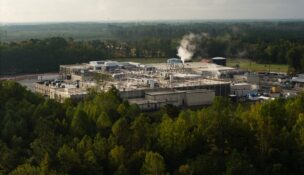Environmental nonprofit plants itself in flood zone
Leah Small //August 29, 2020//
As rising sea levels threaten urban coastal communities, the Portsmouth-based nonprofit Elizabeth River Project is intentionally building its new headquarters on the front lines.
The $4.5 million, three-story building — set to be built on a flood plain along the river in Norfolk — is designed to withstand high waters. It’s a move that comes as neighboring Virginia Beach considers buying out property owners and razing buildings in flood-prone areas.
The appropriately named Resilience Lab, scheduled for completion in the first quarter of 2022, will be a real-time demonstration of how businesses and homeowners can rehabilitate or build on the waterfront in a way that protects both humans and the ecosystem, says Marjorie Mayfield Jackson, executive director and co-founder of the Elizabeth River Project.
“We are not encouraging people to build in the flood plain versus elsewhere,” Jackson says. “[We are] trying to demonstrate the most protective ways to still live and work there as seas rise, since over 90% of our watershed is already developed.”
With a planned elevation of more than 10 feet above ground, the lab is expected to withstand historic flooding. In line with the nonprofit’s environmental mission, builders will use solar and other green power sources, as well as nontoxic building materials. Native and saltwater tolerant plants will serve as natural barriers against erosion and harmful runoff.
Across the street will be Old Dominion University’s Institute for Coastal Adaptation and Resilience at the ODU Research Foundation, and the two facilities plan to collaborate.
Norfolk-based Work Program Architects designed the building, which will include signage and demonstrations explaining the lab’s innovations. The information will be particularly helpful for builders seeking guidance on how to follow revamped city code standards for new construction within flood plains, says Sam Bowling, an architect with WPA.
“Everyone has to comply with this, but it’s already creating some confusion for builders and developers,” Bowling says. “There are [also] alternative paths to green building and sustainable construction that are meant to be achievable for homeowners and small businesses.”
Elizabeth River Project, which was founded in 1993, is close to its $9 million fundraising goal, with a $1 million matching grant from philanthropists Frank and Aimee Batten. The funds will go toward completing the building and expanding an environmental education facility in Portsmouth, as well as producing more outreach programs.
This story has been corrected.
Subscribe to Virginia Business.
l



















